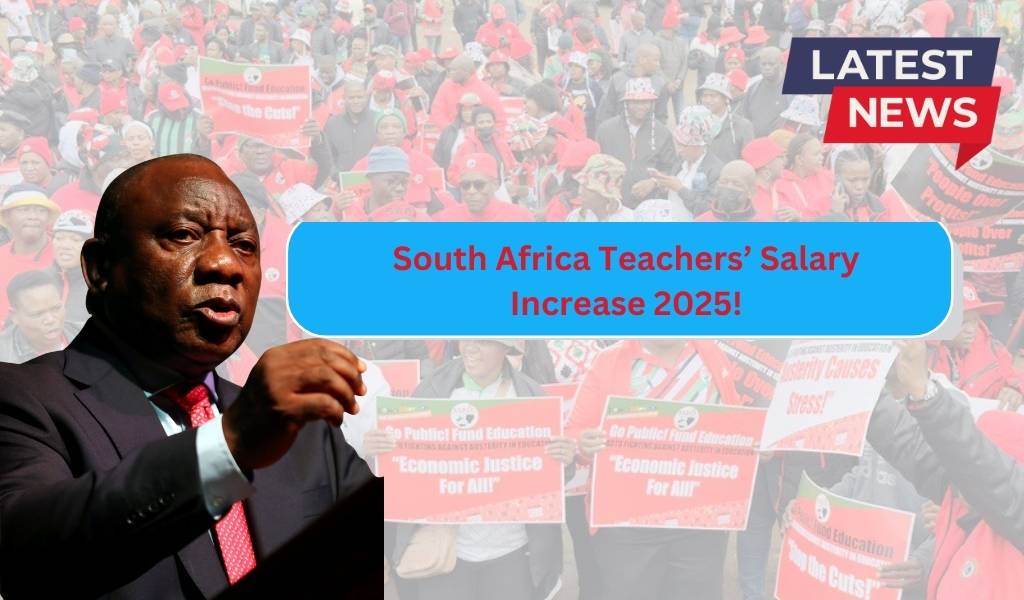In 2025, South African teachers are seeing a welcome boost in their earnings as a 5.5% salary increase takes effect. The government has roll out refresh salary structure that adjusts pay notches for all teaching levels, from new educators to senior principals. This update recognizes the critical role of teachers and aims to ease financial pressures while rewarding qualifications and experience. Curious about what’s changed, who benefits, and what it means for your future income?
Table of Contents
South Africa Teachers Salary Increase 2025
South African teachers have reason to celebrate in 2025, a much-needed 5.5% pay increase is approve for all public school educators; teachers, principals, and support staff alike. This rise is effective from 1 April 2025, part of a multi-year compensation strategy and offers relief from inflationary pressure while boosting morale across the board. This wage adjustment is not just a salary increase; it’s a recognition of the vital role teachers play. While finances alone won’t fix every issue, this step signals renewed respect and opens doors for further progress in the education system.
What’s Changing in 2025?
- Nationwide 5.5% pay boost across all public education roles, starting April 2025.
- Three-year agreement in place, with future raises tied to inflation (CPI), ranging between 4–6% annually through 2027.
- Official pay scales are expected to be released by the Department of Basic Education around June.
How Teacher Salaries Work?
Teacher earnings depend on two factors: qualification level (REQV) and years of experience (notch systems). Higher credentials and more years in service translate to better pay.
| Role/Classification | REQV/Notches | 2024 Annual Pay | Estimated Pay 2025 |
| Entry Teacher | REQV 10–12, Notch 001 | R154,700 | R163,200 |
| Experienced Teacher | Notch 108–268 | R256,400–547,300 | R270,500–577,400 |
| Senior Educator | REQV 13, Notch 200+ | R393,400–547,300 | R415,000–577,400 |
| Master Teacher | REQV 14–17, Notch 232+ | R460,500–723,800 | R485,900–763,600 |
| Department Head | Notch 210–392 | R412,500–997,800 | R435,300–1,052,700 |
| Deputy Principal | Notch 244–408 | R487,700–1,078,700 | R514,600–1,138,000 |
| Principal | Notch 350–432 | R813,700–1,209,300 | R858,400–1,275,800 |
Entry level teachers may now earn about R13,600 monthly, while principals and top heads can exceed R106,000 per month; marking a significant increase.
Who Benefits from Pay Rise?
- All government-employed teachers, from junior to senior levels.
- Support staff included under the public-sector wage deal.
- Enhanced employment perks like medical aid, housing support, pension contributions, and the annual bonus (“13th cheque”) also improve in value.
Advice For Teaching Staff
- Verify your notch position, double-check with HR to ensure correct placement.
- Advance your qualifications, earning BEd Honours or a postgraduate credential can elevate your REQV level.
- Specialize, teachers in subjects like math or science may qualify for additional allowances.
- Union engagement, organizations like SADTU can offer support with disputes or promotions.
- Seek leadership roles, promotions bring better pay, but also greater responsibility.
Why This Increase Matters?
- The 5.5% increase helps preserve teachers’ purchasing power.
- Competitive salaries make teaching a more viable career choice.
- Especially in under-served areas and STEM fields.
- The wage deal helps balance disparities across provinces.
Ongoing Challenges
- Inflation may still outpace the raise.
- Education budgets are under pressure.
- Rural educators still face unequal conditions.
- Infrastructure, training, and digital resources remain critical.
What Lies Ahead?
- 2026–27 raises are expected to follow CPI trends with annual increases of 4–6%.
- Ongoing negotiations continue as unions seek additional support and incentives.
- Additional budgeting is expected to fund rural allowances, classroom modernization, and teacher development.
Frequently Asked Questions
-
When does the new pay scale take effect?
1 April 2025, with full implementation and published scales expected by July 2025.
-
Who is eligible for the raise?
All educators in the public sector, including principals and support staff.
-
How are salaries structured?
Based on REQV (qualifications) and notch (experience). Promotions and higher degrees can boost these.
-
What is REQV?
A way of classifying qualifications, from basic diplomas to advanced degrees.
-
Will it help rural schools?
It’s part of the solution, incentives and broader reforms will also help.
-
How can teachers increase their income further?
Through further education, taking on specialist or leadership roles, and seeking support from unions.
Final Thoughts
The 5.5% raise of 2025 is a major win for South African educators; ,recognition, relief, and a boost to job satisfaction. It reflects a growing respect for teachers. But to truly transform education, it must be paired with improvements in resources, technology, and localized support. Still, for now, it’s a strong signal that society values those who shape the future.

